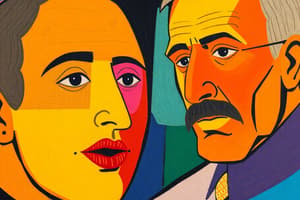Podcast
Questions and Answers
What is the main proposal of the cultivation theory?
What is the main proposal of the cultivation theory?
What is the outcome when people perceive the TV world as the real world?
What is the outcome when people perceive the TV world as the real world?
What is the result of heavy TV viewers interpreting their thoughts and worldview based on what they see on TV?
What is the result of heavy TV viewers interpreting their thoughts and worldview based on what they see on TV?
What is observed among viewers based on their exposure to different TV content?
What is observed among viewers based on their exposure to different TV content?
What do viewers who watch TV frequently tend to believe?
What do viewers who watch TV frequently tend to believe?
What is the outcome of heavy viewers being influenced by the messages from the world of celebrities?
What is the outcome of heavy viewers being influenced by the messages from the world of celebrities?
What is the key proposition of Cultivation Theory?
What is the key proposition of Cultivation Theory?
Which type of analysis in Cultivation Theory identifies the content of message patterns in television and media?
Which type of analysis in Cultivation Theory identifies the content of message patterns in television and media?
Who is credited with expanding and developing George Gerbner's research in Cultivation Theory?
Who is credited with expanding and developing George Gerbner's research in Cultivation Theory?
What does the cultivation analysis in Cultivation Theory involve?
What does the cultivation analysis in Cultivation Theory involve?
Why did early studies of Cultivation Theory focus on heavy television viewers?
Why did early studies of Cultivation Theory focus on heavy television viewers?
What distinguishes Cultivation Theory from other approaches in examining television influence?
What distinguishes Cultivation Theory from other approaches in examining television influence?
What is the primary focus of the cultivation theory?
What is the primary focus of the cultivation theory?
What is the result of increased exposure to television content?
What is the result of increased exposure to television content?
What role has television taken in modern society?
What role has television taken in modern society?
What is the significance of the 2004 study by Jennings Bryant and Dorina Miron?
What is the significance of the 2004 study by Jennings Bryant and Dorina Miron?
What is the ultimate goal of the cultivation theory?
What is the ultimate goal of the cultivation theory?
What is the relationship between television viewership and perception of the real world?
What is the relationship between television viewership and perception of the real world?
Flashcards are hidden until you start studying
Study Notes
- Introduction to cultivation theory and its impact on individuals' attitudes and personalities based on TV viewing habits.
- Cultivation theory proposes that individuals who watch TV frequently are more influenced by the messages portrayed on TV.
- Viewers who watch TV frequently are more likely to be influenced by the messages from the world of celebrities.
- People who watch TV extensively tend to perceive the TV world as the real world, leading to a distorted view of reality.
- Cultivation theory suggests that heavy TV viewers may start to align their attitudes and personalities with what they see on TV.
- TV viewers tend to believe that the TV world reflects the true reality, impacting their perceptions and behaviors.
- Heavy viewers of TV are more susceptible to cultivating attitudes and behaviors depicted on television.
- The study shows that individuals who heavily watch TV are more likely to interpret their thoughts and worldview based on what they see on TV.
- Different types of viewers (light viewers vs. heavy viewers) exhibit varying levels of susceptibility to the cultivation effect of TV.
- The cultivation differential effect is observed among viewers based on their exposure to different TV content.
- Viewers heavily influenced by TV may start to interpret and relate to the world through the lens of TV, blurring the line between reality and TV portrayal.
Studying That Suits You
Use AI to generate personalized quizzes and flashcards to suit your learning preferences.




